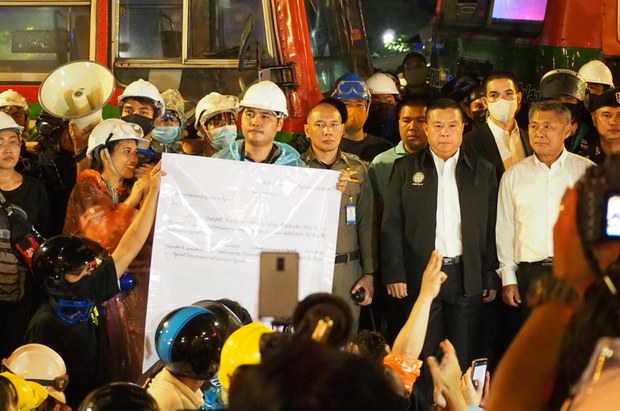Thai Court Revokes Order to Shut Down Voice TV: Lawyer
2020.10.21
Bangkok
 Thai protesters submit their demands for Prime Minister Prayuth Chan-o-cha to quit after thousands marched to Government House in Bangkok, Oct. 21, 2020.
Thai protesters submit their demands for Prime Minister Prayuth Chan-o-cha to quit after thousands marched to Government House in Bangkok, Oct. 21, 2020.
Updated at 5:30 p.m. ET on 2020-10-26
A Bangkok criminal court on Wednesday revoked its order to shut down the website and social media platforms of Voice TV after ruling a government ministry did not prove the outlet spread false information amid anti-government protests, a lawyer for the broadcaster said.
After hearing from the Ministry of Digital Economy and Society (DES) and Voice TV officials, the court determined that DES did not meet its burden of proof in its Tuesday filing, Winyat Chartmontri, a lawyer representing Voice TV, told reporters after the ruling.
“The complaint filed to the court did not contain specific content or messages that were deemed illegal,” he said. “The court ruled that it cannot order the shutdown of the entire channel. Therefore, the original court order was revoked.”
He said the DES did contend that some content compromised national security by inviting people to join the protests in defiance of the emergency decree.
A BenarNews call to the DES on Wednesday went unanswered.
‘Terrible dark cloud’
The month-long emergency decree announced in Bangkok on Oct. 15 banned gatherings of more than four people and prohibited “publication of news, other media and electronic information that contains messages that could create fear or intentionally distort information.”
In a Wednesday evening address to the nation, Prime Minister Prayuth Chan-o-cha announced his willingness to lift the state of emergency if violence associated with the rallies ends.
“I ask the protesters to reciprocate with sincerity, to turn down the volume on hateful and divisive talk, and to let us, together, disperse this terrible dark cloud before it moves over our country,” he said.
Prayuth pointed to incidents on Oct. 16, alleging that “terrible crimes” were committed against police by a small group of violent people using “metal rods and huge cutting implements.”
That night, riot police turned water cannons mixed with a chemical dye that can irritate skin at demonstrators, who were defying the day-old state of emergency. It was the first time Thai authorities used the cannons since a series of mass anti-government and youth-led protests began in mid-July.
Prayuth added that although they were violating the emergency decree, most protesters were “peaceful, well-meaning people who are genuine in their desire for a better society and a better nation.”
“We will not get to such a society by wielding metal bars or the destructive disruption of people’s ability to earn a livelihood, or through offenses against institutions that are held in the highest respect,” Prayuth said. “And, in the same way, we will also not get to a better society through the use of water cannons.”
He reiterated the plan for a special parliament session on Oct. 26 and 27 to discuss efforts to reconcile the protesters’ concerns with those of other members of society.
Meanwhile, thousands gathered in Bangkok on Wednesday for the seventh day of protests since the emergency decree went into effect. Equipped with helmets, masks and umbrellas, the mostly young demonstrators removed police barriers and cut through barbed wire as they marched about 4 km (2.5 miles) from the Victory Monument to the Government House.
As they reached the Government House, where Prayuth’s office is located, they submitted a letter to officials and announced they were calling him to quit.
“Today we witness that the people do not want Prayuth and they want him to resign,” Patsaravalee Tanakitvibulpon, a Mahanakorn University of Technology student said. “Next is the people’s constitution and no more prosecution of our friends.”
The protesters gave Prayuth until the end of the week to leave office.
“But our fight isn’t over as long as he doesn’t resign. If within three days he doesn’t resign, he will face the people again,” Patsaravalee said, according to Reuters news agency.
Minutes later, she was arrested on charges related to breaking the emergency decree on Oct. 15 and taken to a police barracks on the outskirts of Bangkok, where more than 70 other protesters are being detained.
The pro-democracy demonstrators have been holding rallies since July 18, calling for Prayuth to resign, for the constitution to be rewritten and for the royal institution to be reformed.
In a related development on Wednesday, thousands of royalists held protests in several locations to voice support for the royal family. They announced plans to pay homage on Friday to the late King Chulalongkorn on the 110th anniversary of his death.
Other media platforms cleared
Earlier this week, national police chief Gen. Suwat Changyodsuk said he ordered the DES and the National Broadcasting and Telecommunications Commission (NBTC) to monitor Voice TV, three other media outlets – Prachatai, the Standard and the Reporters – and the Facebook page of a student group called Free Youth to determine if they were spreading misinformation or undermining national security.
Winyat said the court cleared the other four as well on Wednesday, without elaborating.
“The court specifically said that press freedom is very important, that it cannot be deprived,” he said.
Titipol Phakdeewanich, dean of the Faculty of Political Science at Ubon Ratchathani University, said the government should not seek to close media because the flow of information is important.
“The protesters do not depend only on these outlets, they are just some of many channels,” he told BenarNews. “The government can never ever close them down.”
CORRECTION: A previous version of this story misidentified the university Patsaravalee Tanakitvibulpon attends.







